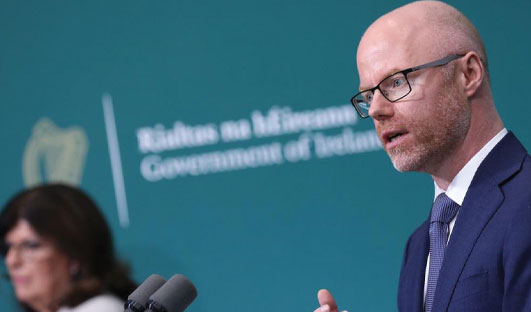Sláintecare 2021 progress report published

The Government has published its 2021 progress report for the implementation of the Sláintecare Reform Programme, showing that 87.7 per cent of 2021’s 228 deliverables have been progressed on track or “with minor challenges” and 12.3 per cent “are progressing with significant challenges”.
Among the most notable of the deliverables said to be facing significant challenges is the development of the six regional health areas, key to the delivery of health in the community, a goal that is at the heart of the Sláintecare reforms. The two deliverables under this umbrella slated for the first six months of 2021 are said to face significant challenge, while the two deliverables in the second half of the year are said to face minor challenges. A regional health areas advisory group has been established by the Government and the report says that “workstreams will be undertaken in 2022”.
The report also states that an extra 42 critical care, 813 acute and 73 sub-acute beds were opened in 2020/21, along with nine more primary care centres and the delivery of GP access to diagnostics in January 2021. As of the publication of the report, 147 primary care centres were in operation in the State, with a further 28 in construction. The GP Direct Access to Diagnostics scheme provided GPs with access to radiology scans through private providers, allowing 138,000 radiology scans to be delivered in the community in 2021.
The Sláintecare Integration Fund is said to have “facilitated the testing and evaluation of innovative models of care”, with 105 out of 123 projects having now been mainstreamed throughout the HSE. Overall, the funding of these projects is calculated to have resulted in 15,370 reduced referrals, 18,914 acute bed days avoided and 8,268 patients off waiting lists. Also calculated to have resulted in a reduction in waiting list numbers was the short-term Waiting List Action Plan, which covered the period of September-December 2021 and resulted in a 5.4 per cent reduction in overall waiting lists from 760,700 to 720,056, in line with the reduction targeted at the outset of the plan.
In line with Sláintecare’s goal of delivering healthcare in the community, programmes such as the Healthy Age Friendly Homes programme were delivered. Healthy Age Friendly Homes, funded by Sláintecare and delivered directly by local government through its Age Friendly Ireland shared service, “aims to enable older people to continue living in their homes or in a home best suited to their needs”. The programme received 800 referrals, undertook 630 home assessment visits, and progressed 1,295 interventions for older people.
“My commitment and the Government’s commitment to reform and universal healthcare is clear and unwavering: we want to ensure every patient receives the right quality care, in the right place, at the right time.”
Minister for Health Stephen Donnelly TD
Approximately 20.5 million hours of home support delivered in 2021 with over 55,000 people receiving the service; these figures represent an increase of 2.9 million more hours, or 17 per cent, compared to 2020 with increased funding having been maintained for 2022. Also key to the delivery of local healthcare was the establishment of 49 community healthcare networks, 15 specialist teams for older persons, and two chromic disease management teams.
The implementation of Sláintecare was not without its controversies in 2021, with three high profile resignations from the Sláintecare implementation advisory council coming throughout the year. Executive Director Laura Magahy and Chairman Tom Keane resigned in September 2021, citing frustrations with the slow pace of progress in the plan. Later in the same month, Anthony O’Connor also resigned from the council, stating in a letter to Minister for Health Stephen Donnelly TD that the original culture of Sláintecare had been “bulldozed” and that the replacements by government were “incongruous” with the principles of the reforms. Foreshadowing the news that the development of regional health areas had faced significant delays, O’Connor wrote that Sláintecare is “doomed to fail” and that devolution of powers to regions and communities “will not happen” and that “fundamental failures of governance, accountability, and commitment continue to make any chance of success impossible”.
In response to these resignations, Secretary General at the Department of Health Robert Watt and HSE CEO Paul Reid have begun to oversee the implementation of the programme, with Donnelly telling the Oireachtas Health Committee that this decision was taken because “change has to be owned by the people in the system itself”. A new programme board chaired by Watt and Reid has been established “to ensure that responsibility for the implementation of Sláintecare is fully embedded across both the Department and HSE”.
Speaking upon the publication of the progress report, Donnelly reaffirmed the Government’s commitment to the delivery of Sláintecare: “My commitment and the Government’s commitment to reform and universal healthcare is clear and unwavering: we want to ensure every patient receives the right quality care, in the right place, at the right time… Targeted investment in areas such as the rollout of structured chronic disease programmes for people with a history of cardiovascular disease, COPD, asthma and type 2 diabetes in GP, nationwide GP access to diagnostics, additional home supports, additional critical care, acute inpatient and community bed capacity, each contribute to a more accessible, equal and fair health service for all.
“Work has commenced on the establishment of a population-based approach to service planning and resource allocation. This will enable us to fund and resource the right kinds of services based on population need and not based on activity alone. Importantly, it will address health inequalities by ensuring that all areas of the population are appropriately represented in how we plan and fund services.”





